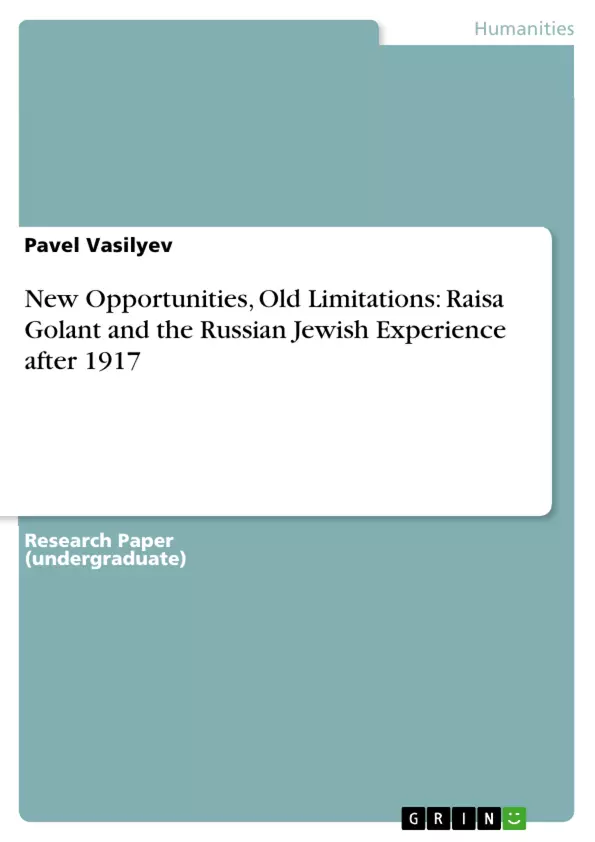The struggle for Jewish emancipation in Russia was a lengthy and difficult process, which was also accompanied by the trends towards gradual modernization, secularization, industrialization and urbanization. In 1917, these processes finally led to the quick transformation of authoritarian monarchy to liberal democracy and then to socialist republic. Many previously oppressed social groups (among them Jews) were legally and socially emancipated in this turbulent period.
In Soviet historiography Jewish emancipation in Russia was considered complete and unequivocal, but Western scholars had more freedom to notice “the ambiguities of liberation” and the contradiction between “anti-Semitism as an official policy” and “one of the hallowed tenets of Marxist socialism which recognized neither Jew, Moslem, nor Christian but only classes and class interests”. In recent decades, the situation in Russia changed, and some historians (the most notable among them is Gennadii V. Kostyrchenko) also began to reconsider traditional Soviet perspectives on Jewish emancipation.
Nevertheless, all these studies largely focus on a relatively limited number of topics, that pertain rather to the realms of 'high' politics, persecutions and state antisemitism. Few studies, however, look at the developments at the micro-level and at the everyday life experience of the Russian Jews after the emancipation. The situation is different with research on Central Europe, where several scholars managed to link Jewish history and the ambiguities of emancipation with such rapidly developing fields as gender studies or history of medicine.
Accordingly, in this paper I use the case-study approach and analyze various materials documenting the life of Soviet Jewish psychiatrist Raisa Iakovlevna Golant (1885-1953) in order to show how professional and personal experience of Russian Jews after 1917 was structured both by positive accomplishments of the emancipation and the preserved limitations. Such a study also contributes to the developments in biographical history, women's and gender history, and history of medicine. To accomplish the above-mentioned goal, I focus on two major tasks: to contextualize my research by describing how other authors assessed the Russian Jewish experience after emancipation; and to explore the life of Raisa Golant with particular attention towards opportunities and limitations that structured her career after 1917.
Inhaltsverzeichnis (Table of Contents)
- The Aftermath of Jewish Emancipation in Russia: New Opportunities, Old Limitations
- The Case of Raisa Golant: Jewish Career in Medicine in Soviet Times
Zielsetzung und Themenschwerpunkte (Objectives and Key Themes)
This paper explores the experiences of Russian Jews following the 1917 emancipation, using the life of Soviet Jewish psychiatrist Raisa Golant as a case study. It aims to demonstrate how both positive and negative aspects of emancipation shaped their professional and personal lives. This study also contributes to the fields of biographical history, women's and gender history, and the history of medicine.
- The impact of Jewish emancipation in Russia after 1917
- The role of education and professional opportunities in shaping Jewish experiences
- The influence of anti-religious measures and anti-Semitism on Jewish life
- The specific challenges and opportunities faced by Jewish women in the Soviet Union
- The impact of historical events like the Holocaust and the Doctors' Plot on Jewish identity and survival
Zusammenfassung der Kapitel (Chapter Summaries)
- The Aftermath of Jewish Emancipation in Russia: New Opportunities, Old Limitations: This chapter analyzes the broader historical context of Jewish emancipation in Russia, focusing on the opportunities and limitations that emerged following the February and October revolutions. It explores the impact of Soviet policies on Jewish life, including anti-religious measures, and the complex interplay of opportunities and limitations that emerged in the context of the changing political landscape.
- The Case of Raisa Golant: Jewish Career in Medicine in Soviet Times: This chapter focuses on the life of Raisa Golant, a Jewish psychiatrist who navigated the complexities of the Soviet system. It examines her professional and personal experiences, highlighting the challenges and triumphs she faced as a woman and a Jew within the changing social and political context of the Soviet Union. This chapter explores her educational journey, her medical career, and the opportunities and constraints that influenced her path.
Schlüsselwörter (Keywords)
This paper explores the Russian Jewish experience after 1917, focusing on Jewish emancipation, anti-Semitism, gender and women's history, the Soviet Union, history of medicine, and the biographical history of Raisa Golant, a Jewish psychiatrist.
Frequently Asked Questions
Who was Raisa Golant?
Raisa Golant (1885-1953) was a prominent Soviet Jewish psychiatrist whose life serves as a case study for the Jewish experience in Russia after 1917.
How did the 1917 revolution impact Jewish emancipation?
The revolution led to the legal and social emancipation of Jews, providing new professional and educational opportunities previously denied under the monarchy.
What were the "ambiguities of liberation" for Soviet Jews?
While Jews gained legal rights, they faced contradictions between official Marxist socialism (which rejected religion) and persistent state anti-Semitism.
What challenges did Jewish women face in the Soviet medical field?
Jewish women like Golant navigated complex gender roles and political shifts, balancing professional success with the limitations of Soviet policies.
How did events like the "Doctors' Plot" affect Jewish professionals?
Historical events such as the Doctors' Plot and the Holocaust significantly impacted Jewish identity, survival, and professional security within the Soviet Union.
- Quote paper
- Pavel Vasilyev (Author), 2009, New Opportunities, Old Limitations: Raisa Golant and the Russian Jewish Experience after 1917, Munich, GRIN Verlag, https://www.grin.com/document/153971



